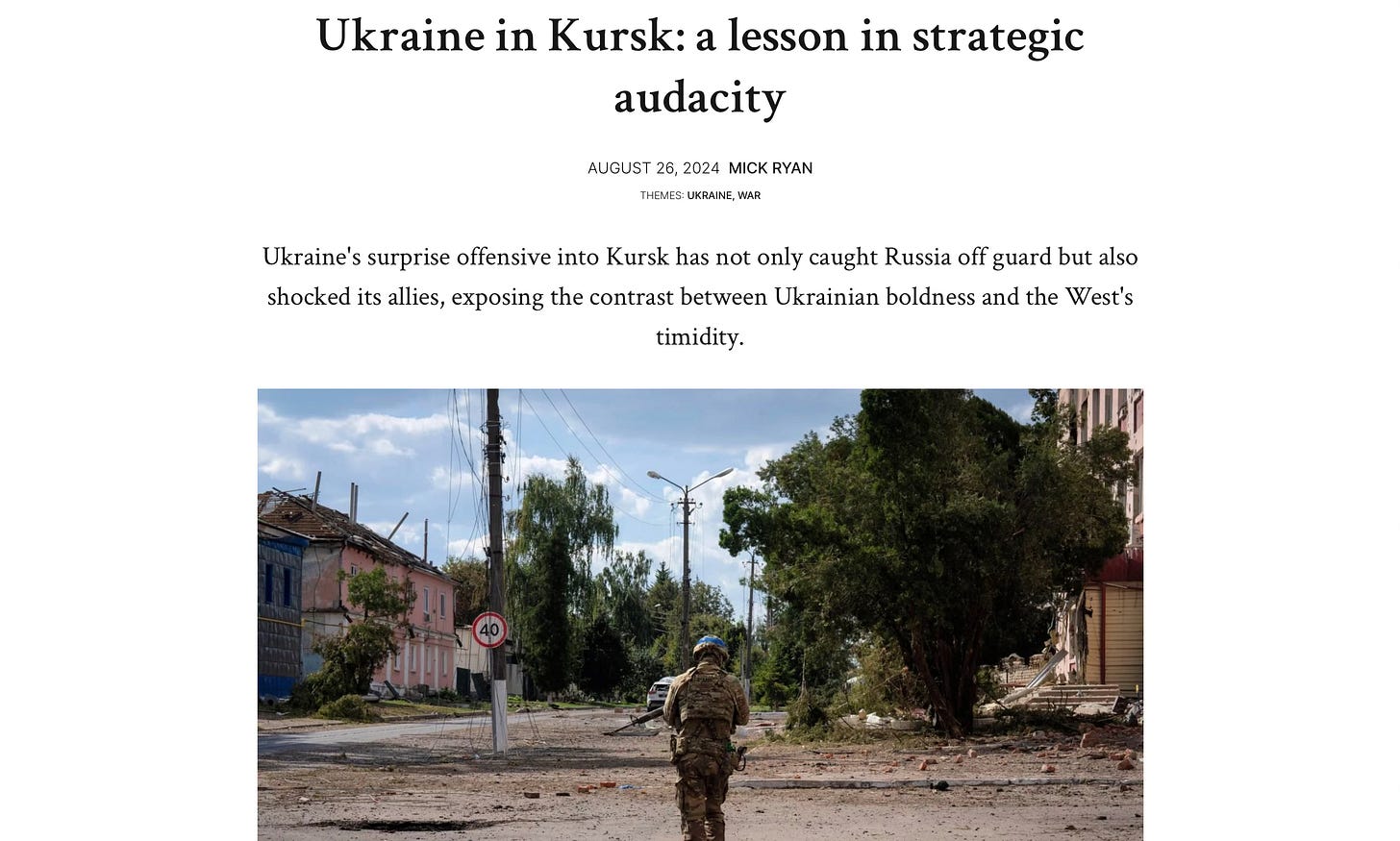Ukraine in Kursk: a lesson in strategic audacity
Ukraine's surprise offensive into Kursk has not only caught Russia off guard but also shocked its allies, exposing the contrast between Ukrainian boldness and the West's timidity.
The Ukrainian attack into Kursk in Russia, now into its third week, was a tactical and operational surprise for the Russians. There are many reasons for this, including Russia not assembling all the available pieces of intelligence to anticipate the Ukrainian attack, the Ukrainian deception plan, and a failure of humility on the part of Putin’s regime and military.
The Ukrainians have also surprised their supporters in the West. This was in large part because Ukraine deliberately withheld details of the Kursk attack to preserve operational security, maximise its chances of achieving surprise and shock against the Russians, guard against the inflated expectations of the failed 2023 counteroffensive and avoid second guessing by talkative, risk-adverse bureaucrats in the West.
Ukraine has shown that, fortunately, strategic audacity is not entirely dead in democratic nations.
In early August, reports emerged of a Ukrainian incursion into Russia’s Kursk oblast. For the first 24 hours, most observers – and the Russian high command – assumed that this was just another small-scale, unconventional Ukrainian operations of the kind it has mounted twice into Belgorod.
It soon became clear that this was something larger in scale and aspiration. Multiple Ukrainian brigades, or elements of brigades, were identified taking part in the operation through open-source intelligence. Those identified as leading the way were first-rate, well-equipped formations such as the 22nd and 80th Brigades. The Ukrainians, in what appears to have been an efficient combined-arms breaching operation, rapidly punched through the Russian defensive lines.
Russian forces in the region were quickly overwhelmed. Ukrainian forces poured across the border through gaps created in the breaches and captured nearly 1,500 square kilometers of Russian territory. By comparison, Russian forces have captured less than half this amount of territory in Ukraine this year – at a cost of nearly 200,000 casualties.
Even in the early phase of this 21st-century Battle of Kursk, the Ukrainians have demonstrated that they have learned the hard lessons of last year’s failed counteroffensive. Their preparations had been meticulous. The Ukraine preserved operational security, denying the Russians crucial information about where it might strike and with what strength. Importantly, using a defensive operation in Sumy as a cover story, they denied the Russians the knowledge that Ukrainian offensive operations were even under consideration. Ukraine also used very experienced formations for the initial phases of the operation, unlike in their 2023 counteroffensive. They maximised the use of drones and snuffed out the Russian drone forces across a huge swathe of Kursk in the lead up to and in the early hours of their operation. This denied Russia crucial and timely intelligence.
The operation is not without risks. The Russian advances in the Donbas are taking ground and threatening a key line of defended cities in eastern Ukraine. Losing these would cause significant challenges for the Ukrainian defensive campaign and political challenges for President Zelenskyy. Their capture by Russia would have significant propaganda value and reinforce Russian narratives of an ‘inevitable victory’.
Ukraine is in the process of reconstituting its forces in the wake of the 2023 counteroffensive and after nearly nine months of Russian offensives in eastern Ukraine. Most external observers assumed they did not have the forces available for such an operation. By not using their reserves to reinforce troops in the Donbas, and instead using them in Kursk, Ukraine has taken a major risk, but an informed risk. No outside observer of the war has all the data available to the Ukrainian general staff that is making such decisions.
The status quo of the war before the offensive was not sustainable for Ukraine. It is incurring unacceptable humanitarian and strategic costs. Appreciating that NATO strategy for supporting Ukraine is unlikely to shift beyond its ‘defend Ukraine’ approach; that no significant shift in US policy is likely before next year; and that Putin retains his aspiration to exterminate its sovereignty and culture, Ukraine knew that it was the only actor that could change the status quo in the war. The surprise attack into Kursk, with its political, strategic and military objectives, is the result.
Read my full article for free at Engelsberg Ideas here.





I believe that we in the west have forgotten what it feels like to be in a war of national survival. In the UK our grandfathers generation knew this all about this, and of course many others in Europe suffered greatly due to the Second World War being fought on their lands.
But we have forgotten.
Strategic timidity is an apt but accurate term for this.
Nice article. I hope it is read by our governments.
Great piece Mick.